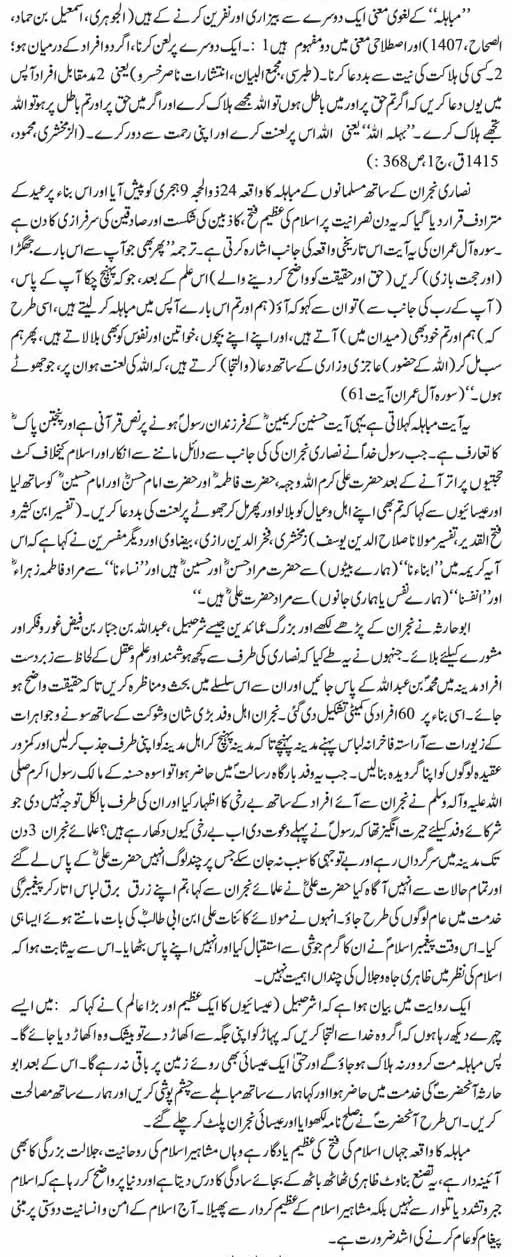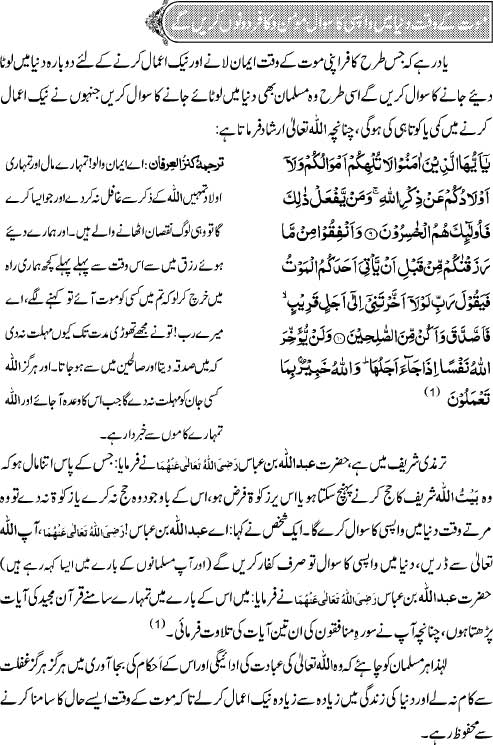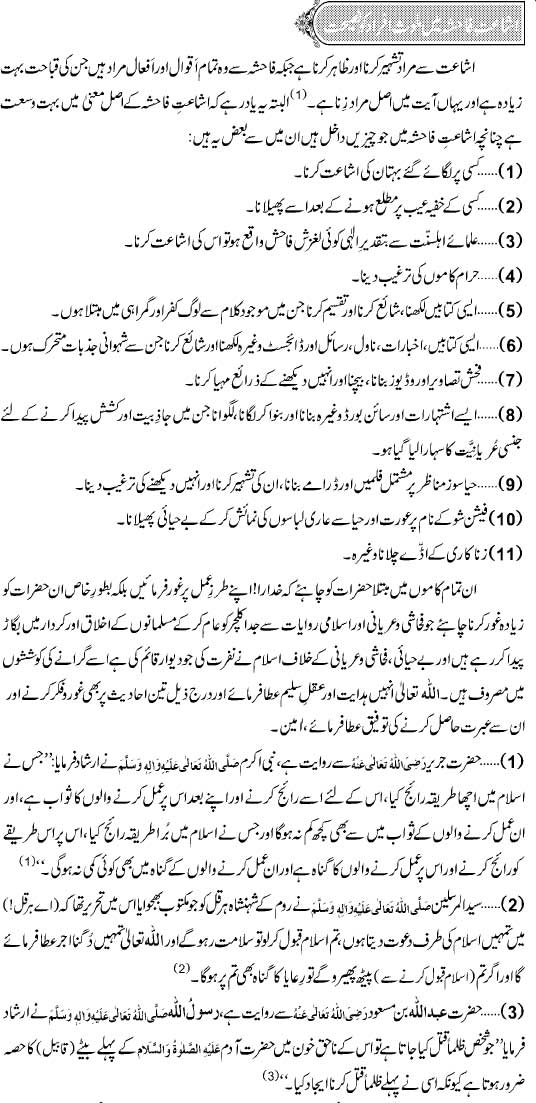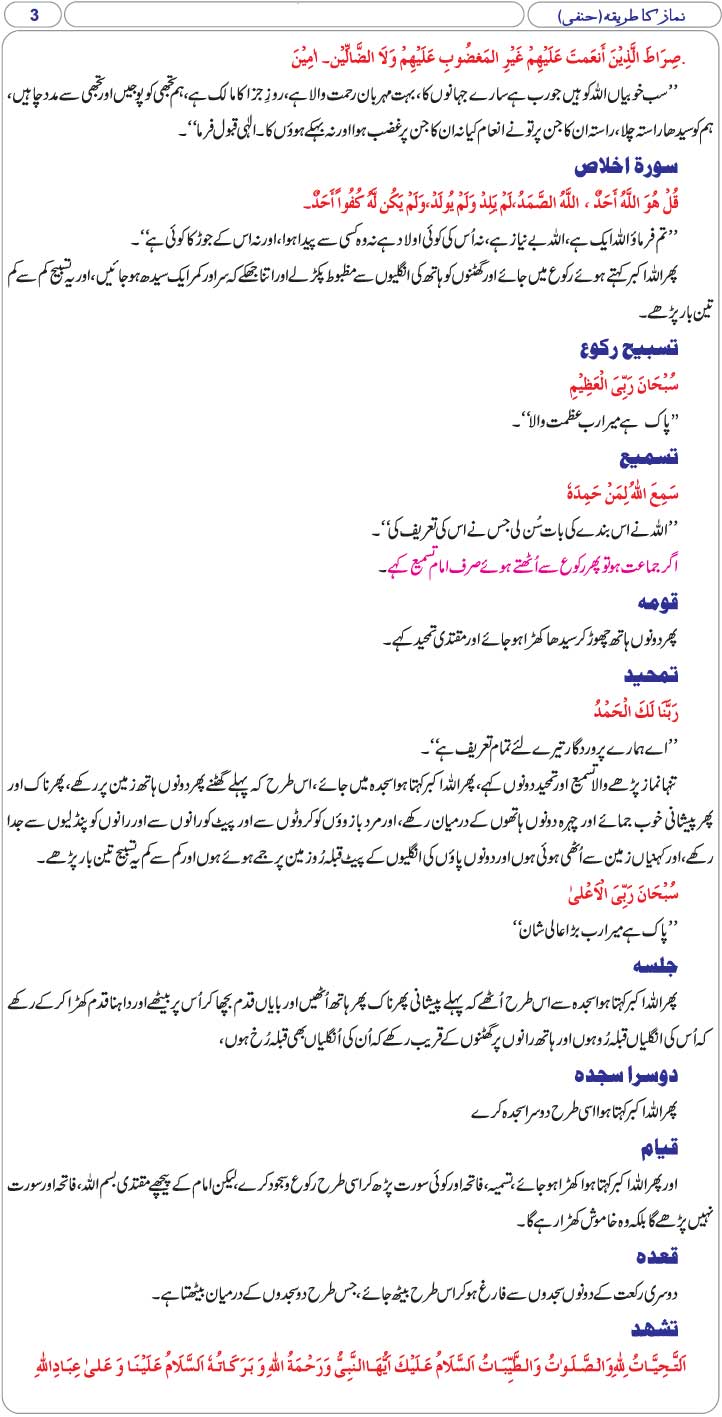
Punishments Of Hell
Here are the punishments in front of Hell in front of us. Realize and see where you are standing now…..
1. Hell is so deep that if a stone were to be thrown into, it would travel for 70 years to reaching at the bottom.
2. The breadth of each of the four walls around Hell is equivalent to a distance covered by a walking journey of 40 years.
3. Hell has 7 gates.
4. Hell had been lit for one thousand years until its flames became red. Again it was heated for another thousand years till its color became white. Still again it was burnt for further thousand years and its white color flames turned pitch black.
5. Even the fiercest fire of this world is 70 fold cooler than the fire of Hell.
6. The lightest punishment in Hell would be the wearing of “Fiery shoes” which would cause one’s brain to boil.
7. Hell in infested with venomous donkeys and if they were to bite a person then he or she will suffer pain for 40 years.
8. For food, the dweller of Hell would be given Zaqqum which is a prickly tree, so bitter, that even if a single molecule of it were to spill onto this earth it would make all the foodstuff of the world bitter and unpalatable.
9. For drinking, the denizen of Hell would be provided with hot, boiling pus mixed with blood, matter and tears etc. of the dwellers of Hell. If a bucket of this foul liquid were to be splashed over this earth, the entire world would be upset and disrupted by its most foul stink.
10. Boiling water would be poured over Jahannami’s head and this will cause their internal organs to melt and leak out through their feet.
11. The inmates of Hell would be lashed with heavy clubs of iron. If one such club was to be placed upon this earth, the combined strength of all the human beings, as well as all the Jinns, would fail to lift it; and if a mountain is struck with one of these clubs it would cause the whole mountain to disintegrate.
12. The dwellers of Hell would be burnt daily for 70 thousand times.. Every time, after the skin and flesh is burnt; they would be restored to life so that they can continuously taste this punishment.
13. A drunkard will be given blood, pus, sweat, filth, etc.. to drink in hell.
14. All the haughty people will be gathered in the Hereafter and driven towards Hell but their bodies would be reduced to the size of ants and they will be given to consume the excretions of the dwellers of Hell.
15. Some sinners would be made to climb “SAUD” which is a mountain of fire in Hell, and then dropped from its peak and this process would continue forever and ever.
16. The dwellers of Hell would be pound in chains which would be greater in length than the distance between the sky and the earth.
17. The clothes of sinners in Hell would be highly inflammable.
18. Beside physical torture, the dwellers of Hell would also be subjected to mental harassment through the taunting by the guardian of Hell who will remind them of their misdeed on earth and remarks “Now taste the fire” etc.
19. The sinners and disbelievers would be humiliated to such an extent that besides their revolting ugliness and pitch black faces, their upper lips would be touching their foreheads and the lower lip dangling around the navel.
20. The dwellers of Hell would weep so much and shed so much of tears and blood that furrows would be formed on their cheeks.
21. The tongues of Hell-inmates would be so long and protruding from there mouths that others would trample and step on them.
22. Shayateen will also rebuke the denizens of Hell.
23. The dwellers of Hell would display their rage and fury on those who led them astray.
24. The inhabitants of Hell would appeal to the guardians of Jahannam to intercede on their behalf in the court of Allah but their pleas would reject. They would make direct supplication to Allah but their prayers would not be granted.
25. They will then abide forever in Hell, continuously lamenting and braying like asses (jungle animals).
- July, 14
- 4752
- Paradise-Hell
- More
The Model Life Companion
Happiness is the word that sums up the first marriage of the Prophet (peace be upon him). Khadijah gave him all that a man needs from a loving, caring and thoughtful wife. When we remember that Khadijah was a woman of sound mind and willing to place duty above comfort, we realize that the Prophet had nothing to worry about at home as he went about delivering his message and discharging the task assigned to him by God. He appreciated all that she gave him and her memory remained alive with him to his last day. As it is well known, the Prophet lived with Khadijah for 25 years without ever entertaining a thought of marrying another woman, although polygamy was accepted as perfectly normal in his community, if not throughout the world. After she passed away, he married several wives but she retained her supreme position in his heart. Ayesha, the one of his later wives he loved most says: “No woman did I envy as much as I envied Khadijah, even though the Prophet married me only after she had died.”
What distinguished Khadijah was the fact that she was the only one of the Prophet’s wives who married him 15 years or longer before the start of his message. She was a mature woman who had married twice before and had children through her earlier marriages. She was the one to propose marriage, because Muhammad (peace be upon him) could not have thought that such a marriage would have been possible, due to his poverty while Khadijah was a rich woman who employed him and others on her business. She recognized his fine qualities and refined character. Their mutual love was of the deeply rooted, profound type that gets stronger every day.
When the Prophet began to receive his message, she gave him all the reassurance he needed. It was the sort of reassurance that a wise woman could give, looking at her husband’s character and standing. When he expressed his worries after his first encounter with the angel, she said to him: “You have nothing to fear; be calm and relax. God will not let you suffer humiliation, because you are kind to your relatives, you speak the truth, you assist anyone in need, you are hospitable to your guest and you help in every good cause.” A man who combined all these characteristics would never be humiliated by God. Hence, once she realized the nature of the message assigned to him, she was the first to believe in him. She continued to give him her unwavering support to the last day of her life. When she passed away, the Prophet called that year ‘the year of sorrow’. A few weeks earlier he had lost his uncle Abu Talib who ensured his protection and supported him against the combined efforts of his people, the overwhelming majority of whom remained strongly opposed to his message.
The Prophet lived 13 years after Khadijah had passed away during which he married several women. Yet he continued to cherish her memory to his last day. Her position in his heart and mind is summed up in the following Hadith reported by Ayesha: “Halah bint Khuwaylid (Khadijah’s sister) announced herself as she came visiting the Prophet. The Prophet was startled as she sounded very similar to Khadijah. He said: ‘My Lord, let that be Halah.’ I felt jealous and said: ‘Why do you keep remembering an elderly woman from the Quraysh, with reddened mouth edges, who had died long ago, when God has given you a wife better than she was?’ He said: ‘By God, He has not given me better than her. She believed in me when others denied me, gave me full support when others let me down, and helped me with her money when others left me deprived. ” (Related by Al-Bukhari and Muslim).
- July, 13
- 2423
- Prophet Character
- More
Moat Kay Waqt

As Hajj Approaches, Ummah Gets United
Prophet Muhammad (peace be upon him) delivered a passionate and soul-stirring sermon during his first and only Haj on the 9th of Dhul Hijjah – the day of Arafah. The sermon, which is popularly known as the Farewell Sermon, is recorded in several authentic books of Ahadith, including Sahih Al-Bukhari and Musnad Ahmad. The Prophet (peace be upon him) did not live till next year’s Haj and this was his farewell address to the tens of thousands of Muslims who did the pilgrimage with him.
“O People, just as you regard this month, this day, this city as sacred, so regard the life and property of every Muslim as a sacred trust. Return the goods entrusted to you to their rightful owners. Treat others justly so that no one would be unjust to you. Remember that you will indeed meet your Lord, and that He will indeed reckon your deeds.”
The Prophet also exhorted the Muslims to fear Allah regarding women and to keep their hands off each other’s wealth and property. The 9th of Dhul Hijjah is sacred even for those Muslims who are not performing Haj. Its fast is an expiation for sins committed in the previous year and the next. (Sahih Muslim, no. 1162)
The sight of hundreds of thousands of Muslims embarking on their journey of Haj, proclaiming the talbiyah, telecast all around the world calls us to think about the time when Prophet Ibrahim (peace be upon him) built the Ka’bah with his son Isma’il in the scorching, arid, and barren valley of Makkah thousands of years ago. He found it incredible that people would one day throng this Sacred House, in this uninhabited land, to answer their Lord’s call for Haj. He therefore prayed for Makkah to be blessed with fruit and provision from all around, and for people’s hearts to be inclined towards its people.
“O our Lord! I have made some of my offspring to dwell in a valley without cultivation, by Your Sacred House; in order, O our Lord, that they may establish regular Prayer: so fill some hearts among men with love towards them, and (O Allah) provide them with fruits so that they may give thanks.” (Qur’an, 14:37)
He then proceeded, in submission to Allah’s command, to make the call for Haj to all mankind. Allah responded by declaring that a day would come, when this Sacred House would bring forth pilgrims from every distant valley, and on every riding beast available to them; they would come, responding to Allah’s call for Haj.
“And proclaim to mankind the Haj (pilgrimage). They will come to you on foot and on every lean camel, they will come from every deep and distant (wide) mountain highway (to perform Haj).” (Qur’an, 22:27)
The blessing is apparent. The Muslim Ummah, though divided today by sects, groups, and international borders, unites into one nation. Yes, we all unite during Haj, Alhamdulillah. We put everything aside to respond to Allah’s call. All pilgrims gather together on a single stretch of land – the plain of Arafah. Away from their comfortable homes, dressed in a pair of unstitched cloths, their faces covered with dust, their heads unprotected from the sun, their bellies half-empty, and their hearts humbled, they stand in remembrance of their Lord, turning to Him in repentance and submission. The most diehard of sinners can, on this day, transform into a humble, penitent servant with the mercy of Allah.
The Prophet (peace be upon him) said: “There is no day on which Allah frees more of His slaves from the Fire than the day of Arafah. He draws close then He praised them before the angels and says, ‘What do these people want?’” (Sahih Muslim, no. 1348)
After returning from Arafah, however, some unfortunate Muslims fall into the trap of Satan and fall into petty disputes about petty matters! They forget the essence of Haj, which teaches valuable lessons of mutual harmony and forbearance, as the Prophet advised in his last sermon.
Nothing rings true as much as the part of his sincere speech quoted below, the message of which, if Muslims were to take back home with them after Haj, would change their attitudes for good: “Know that every Muslim is a brother to every Muslim and that the Muslims constitute one brotherhood. Nothing shall be legitimate to a Muslim, which belongs to a fellow Muslim, unless it is given freely and willingly. Do not, therefore, be unjust to yourselves.” (Al-Bukhari, no. 1623; and Muslim, no. 98)
Learning Hajj Contemplations For Spirituality
1. This is a journey that was under taken by Prophets and Messengers before you. Those who take the path of the Prophets affirm the Tawheed of Allah. Some come to perform Haj with their hearts attached to other than Allah. They invoke the dead and the righteous, whether present or absent. Such actions are the opposite of Tawheed (which means to worship Allah alone). They are Shirk no matter what people may term them because those deeds amount to setting up partners with Allah. So, free your intention from any devotion to other than Allah. Repent and come with a sincere heart submitting to Allah (alone) remembering what Prophet Ibrahim and his son Isma’il (peace be upon him) said when they were raising the foundations of Allah’s House, the Ka’ba:
“Our Lord! And make us submissive unto You and of our offspring a nation submissive unto You, and show us our Manasik (all the ceremonies of pilgrimage – Haj and Umrah, etc.), and accept our repentance. Truly, You are the One Who accepts repentance, the Most Merciful.” (Qur’an, 2:128)
2. You are set to depart and you may or may not return to your home. Make this journey to Allah’s House as Allah wants it. Think of the next journey that is surely coming, the one that leads to the meeting with Allah, Most High. This raises questions like: What did I prepare for that Day? Am I following Allah’s Commands? Am I a follower of the Sunnah of Prophet Muhammad (peace be upon him)? Do I really know Allah?
“And invoke not any other ilah (god) along with Allah, La ilaha illa Huwa (none has the right to be worshiped but He). Everything will perish save His Face. His is the Decision, and to Him you (all) shall be returned.” (Qur’an, 28:88)
3. When you reach the Meeqat, remind yourself that there is another Meeqat that is still to come. It is the Meeqat (appointed meeting) on the Day of Resurrection:
“Say (O Muhammad, peace be upon him): ‘(Yes) verily, those of old, and those of later times. All will surely be gathered together for appointed Meeting of a known Day.’” (Qur’an, 56:49-50)
4. When you start the Talbiyah remember the Command of Allah to Prophet Ibrahim (Peace be upon him):
“And proclaim to mankind the Haj (pilgrimage). They will come to you on foot and on every lean camel, they will come from every deep and distant (wide) mountain highway (to perform Haj).” (Qur’an, 22:27)
The Talbiyah you make is in response to Prophet Ibrahim’s (peace be upon him) proclamation to visit Allah’s house of worship.
5. Upon entering Makkah remember that you are in the Secure Sanctuary:
“Have We not established for them a secure sanctuary (Makkah), to which are brought fruits of all kinds, a provision from Ourselves, but most of them know not.” (Qur’an, 28:57)
Let one devote himself to seeking repentance, having a good view of Allah, hoping that Allah will grant him security from His Punishment.
6. You will enter one of the gates of Al-Masjid Al-Haraam. Then there you are before the magnificent House of Allah, Most High, the Ka’bah. Now you see what you hoped to see for a long time. Thank Allah for making this possible and hope that He will grant you the greatest reward of seeing His Majestic Face on the Day of Resurrection. This thankfulness is not just in saying Alhamdulillah, but by obeying Allah while on Haj and for the rest of your life.
7. You start your Tawaf knowing that it is a great time for glorifying Allah. Remember Him by His Names, Attributes and Actions. Also while in Tawaf try to reflect upon the time when Prophet Muhammad (peace be upon him) was prevented from doing the same thing you are doing today.
Then think about what he did in clearing out the site from the symbols that were worshiped besides Allah. All idols were demolished. Make lots of du’a. Ask Allah to guide you to hold on to the correct belief till your death. Ask Allah to save you from all forms of Shirk and Bid’ah.
Namaz Ka Tareeqa And Nafil Namaz
Benefits Of Reciting Quran
“When a man dies and his relatives are busy in funeral, there stands an extremely handsome man by his head. While the dead body is shrouded, that man gets in between the shroud and the chest of the deceased. When after the burial, the people return home, 2 angels, Munkar and Nakeer(names of two special Angels), come in the grave and try to separate this handsome man so that they may be able to interrogate the dead man in privacy about his faith. But the handsome man says, “He is my companion, he is my friend. I will not leave him alone in any case. If you are appointed for interrogation, do your job. I cannot leave him until I get him admitted into Paradise”.
Thereafter he turns to his dead companion and says, “I am the Qur’an, which you used to read, sometimes in a loud voice and sometimes in a low voice. Do not worry. After the interrogation of Munkar and Nakeer, you will have no grief.” When the interrogation is over, the handsome man arranges for him from Al-Mala’ul A’laa (the angels in Heaven) silk bedding filled with musk.
Rasulullah (Sallallahu alaihe Wa-aalihi wasallam) said:
“On the Day of Judgment, before Allah, no other intercessor will have a greater status than the Qur’an, neither a Prophet nor an angel.”
Our position in Paradise is determined by the amount of Qur’an we memorize in this life! ‘Abdullaah ibn ‘Amr ibn Al-‘Aas heard the Prophet (sallallaahu ‘alaihi wa sallam) saying: “It will be said to the companion of the Qur’an: Read and elevate (through the levels of the Paradise) and beautify your voice as you used to do when you were in the dunya! For verily, your position in the Paradise will be at the last verse you recite!” [Aboo Daawood and At-Tirmithee, saheeh]
There are ten rewards for each letter you recite from the Qur’an. As an authentic hadith in At-Tirmithee proves: “Whoever reads a letter from the Book of Allah, he will have a reward. And that reward will be multiplied by ten. I am not saying that “Alif, Laam, Meem” is a letter, rather I am saying that “Alif” is a letter, “laam” is a letter and “meem” is a letter.” So increase your recitation of the Qur’an to gain these merits, and to gain the following merit as well.
The benefits of memorizing Quran are infinite…. Alhamdulilah!
The Prophet (May peach be upon him) said, “Whoever takes a path seeking knowledge by it, Allah will facilitate for him a path to Paradise because of it. And indeed the angels lower their wings for the student of knowledge, pleased because of what he is seeking (knowledge). And verily those who are in the heavens and the earth, even the fish in the water, seek forgiveness for the scholar .” (Ahmad )
Ishaat-e-Fahsha

A Lost Sunnah, How The Prophet Behaved In His Home
Since childhood we men see our mothers and sisters working in the kitchen , doing the daily routine household chores of our home.
After we grow up , we behave in the same way and like the “King who enters in his house” (and does nothing) , we start commanding thing and start getting it done by the wife or the servant.
We only remember the ayat from the Quran “wherin men are allowed to have 4 wives…” but easily forget how the Prophet behaved when he was in his home.
So what did Prophet do when he would spend time in his home. ?
Order everyone to clean the house ?? NO
Lie down on the bed and leave as it is ?? NO
Order nicest dishes to be prepared ?? NO
Eat and Sleep ?? NO
So what did Prophet do when he would spend time in his home. ?
The Apostle of Allah (sallallahu alayhi wa sallam) occupied himself at his home like a common man.
As Aishah relates, he used to clean his clothes, milk the sheep and himself do his odd jobs. She also says that he would mend his clothes, repair his shoes and do similar other works.
When asked how the Prophet occupied himself at home, she replied, “He used to keep himself busy in household chores and went out when the time for prayer came.”
In another report related on her authority, she is reported to have said, “The Prophet of Allah (sallallahu alayhi wa sallam) used to repair his shoes, mend his clothes and occupied himself at home even as any of you occupy yourself.”
Aishah relates, “Allahs Messenger (sallallahu alayhi wa sallam) was very softhearted, the kindliest of all. He laughed often and smiled much.”
Anas says that “he had not seen a man who was more clement and nice to his household members than the Apostle of Allah.”
It is related on the authority of Aishah that the Prophet (sallallahu alayhi wa sallam) said, “The best of you is one who is most nice to his wife and children and I am the nicest among you.”
Abu Huraira said that the Prophet (sallallahu alayhi wa sallam) never expressed disapproval of any food, if he desired he ate it, and if he disliked he left it alone.”
- July, 3
- 2764
- Prophet Character
- More






